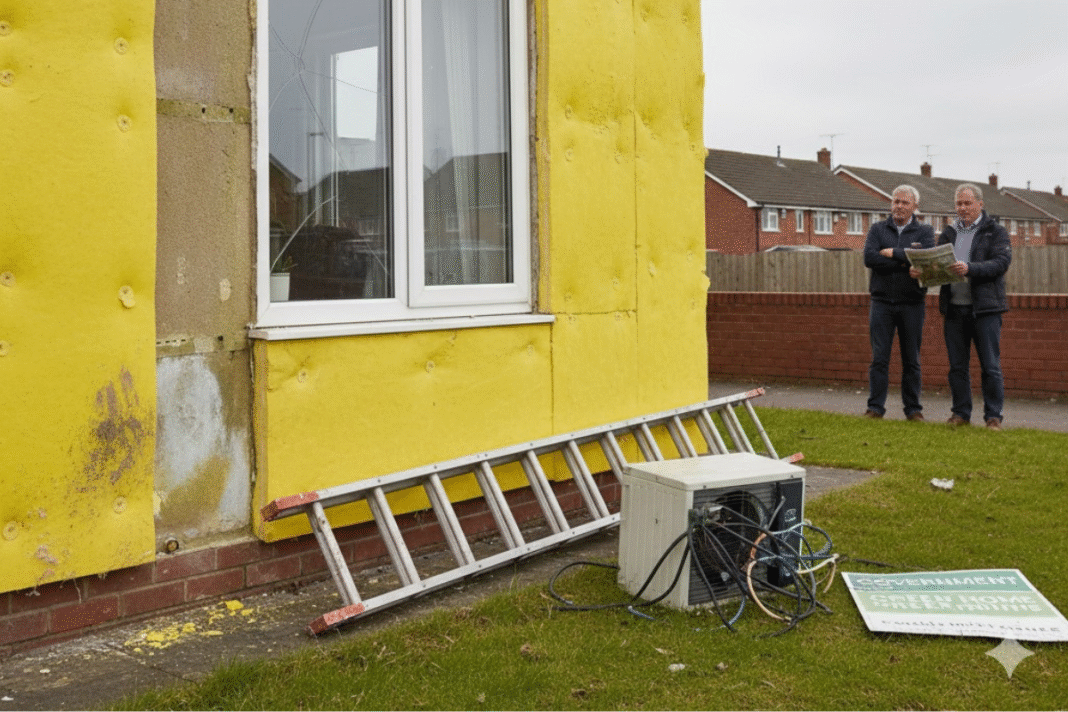The government’s flagship home-energy efficiency schemes have been hit by a damning audit that reveals widespread failures in quality control, compliance and oversight, leaving tens of thousands of households with defective or unsafe insulation work.
The National Audit Office (NAO) found that 98% of external wall insulations installed under the Energy Company Obligation 4 (ECO4) since 2022 require corrective work, affecting up to 23,000 homes, while 6% pose immediate health and safety risks to occupants.
The findings raise serious questions over the government’s management of the ECO4 and Great British Insulation Scheme (GBIS), both designed to cut household emissions and make homes warmer and cheaper to heat, particularly for low-income families.
Instead, the audit exposes a system plagued by poor workmanship, weak oversight, and suspected fraud.
COMPLIANCE BREAKDOWN
Ofgem has reported possible overclaiming by some contractors, with investigations under way into what could prove one of the most serious compliance breakdowns in the retrofit sector to date.
Sián Hemming-Metcalfe, operations director at Property Inspect, reckons that the audit should be a turning point for the entire property sector.

“This is a big red flag for anyone in property operations, inspections, compliance and tech: you’ve got what was meant to be an efficiency and good-housing upgrade scheme working entirely backwards,” she says.
“Homes meant to become warmer and more efficient are now at risk of being colder, damp, mould-ridden, or even worse. Government-backed no longer means compliant or trustworthy — that assumption is no longer safe.”
SYSTEMIC WEAKNESS
The NAO’s findings point to systemic weaknesses in oversight that allowed poor-quality and potentially unsafe work to go unchecked. Experts say the implications stretch far beyond the affected households, threatening to undermine confidence in future retrofit and net-zero programmes.
Hemming-Metcalfe says the industry now faces urgent questions about accountability and remediation.
And she adds: “This demands an industry-wide reset. Should inspection workflows now include specific checks for works carried out under ECO4 or GBIS? Should we be flagging and monitoring homes at risk of substandard retrofits? Should contractors be allowed to effectively mark their own homework?” she said.
“The government must provide clear answers: who will fix these homes, and how will they ensure it doesn’t happen again?”
COMPROMISED HOMES
With thousands of homes potentially compromised, the scandal threatens to derail public trust in state-backed decarbonisation programmes.
“The impact goes far beyond defective insulation,” Hemming-Metcalfe says. “It undermines confidence in national infrastructure schemes. Unless there is a total overhaul in how such programmes are designed, delivered and audited, the damage will extend far beyond the properties themselves.”
Industry leaders are now calling for stricter inspection frameworks, independent auditing, and better use of technology to verify retrofit work in real time.
“This is not just about poor workmanship,” Hemming-Metcalfe adds. “It’s about safeguarding health, ensuring public safety, and restoring faith in how we manage housing improvements. This scandal cannot be brushed aside as a bureaucratic failure – it must be a turning point in how government-funded schemes are held to account.”









